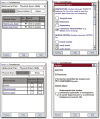The implementation of a mobile problem-specific electronic CEX for assessing directly observed student-patient encounters
- PMID: 20174616
- PMCID: PMC2823396
- DOI: 10.3402/meo.v15i0.4276
The implementation of a mobile problem-specific electronic CEX for assessing directly observed student-patient encounters
Abstract
Background: Facilitating direct observation of medical students' clinical competencies is a pressing need.
Methods: We developed an electronic problem-specific Clinical Evaluation Exercise (eCEX) based on a national curriculum. We assessed its feasibility in monitoring and recording students' competencies and the impact of a grading incentive on the frequency of direct observations in an internal medicine clerkship. Students (n = 56) at three clinical sites used the eCEX and comparison students (n = 56) at three other clinical sites did not. Students in the eCEX group were required to arrange 10 evaluations with faculty preceptors. Students in the second group were required to document a single, faculty observed 'Full History and Physical' encounter with a patient. Students and preceptors were surveyed at the end of each rotation.
Results: eCEX increased students' and evaluators' understanding of direct-observation objectives and had a positive impact on the evaluators' ability to provide feedback and assessments. The grading incentive increased the number of times a student reported direct observation by a resident preceptor.
Conclusions: eCEX appears to be an effective means of enhancing student evaluation.
Keywords: clinical clerkship; clinical competence; computers; handheld; internal medicine; medical; observation; students.
Figures
Similar articles
-
Implementation of the mini-CEX to evaluate medical students' clinical skills.Acad Med. 2002 Nov;77(11):1156-7. doi: 10.1097/00001888-200211000-00021. Acad Med. 2002. PMID: 12431932
-
Implementation of a Mini-CEX Requirement Across All Third-Year Clerkships.Teach Learn Med. 2016 Oct-Dec;28(4):424-431. doi: 10.1080/10401334.2016.1165682. Epub 2016 May 4. Teach Learn Med. 2016. PMID: 27141826
-
Emergency medicine clerkship encounter and procedure logging using handheld computers.Acad Emerg Med. 2007 Aug;14(8):727-31. doi: 10.1197/j.aem.2007.04.013. Epub 2007 Jun 29. Acad Emerg Med. 2007. PMID: 17601997
-
Clinical skills training in undergraduate medical education using a student-centered approach.Dan Med J. 2013 Aug;60(8):B4690. Dan Med J. 2013. PMID: 23905573 Review.
-
In-training assessment using direct observation of single-patient encounters: a literature review.Adv Health Sci Educ Theory Pract. 2011 Mar;16(1):131-42. doi: 10.1007/s10459-010-9235-6. Epub 2010 Jun 18. Adv Health Sci Educ Theory Pract. 2011. PMID: 20559868 Free PMC article. Review.
Cited by
-
Using mobile technology in assessment of entrustable professional activities in undergraduate medical education.Perspect Med Educ. 2021 Dec;10(6):373-377. doi: 10.1007/s40037-020-00618-9. Perspect Med Educ. 2021. PMID: 33095399 Free PMC article.
-
Using cloud-based mobile technology for assessment of competencies among medical students.PeerJ. 2013 Sep 17;1:e164. doi: 10.7717/peerj.164. eCollection 2013. PeerJ. 2013. PMID: 24109549 Free PMC article.
References
-
- LCME. Washington, DC: Liaison Committee on Medical Education; 2009. Accreditation Standards [Internet] [updated 30 October 2009]; Available from: http://www.lcme.org/functionslist.htm [cited 7 Dec 2009]
-
- Howley LD, Wilson WG. Direct observation of students during clerkship rotations: a multiyear descriptive study. Acad Med. 2004;79:276–80. - PubMed
-
- Pulito AR, Donnelly MB, Plymatle M, Mentzer RM., Jr. What do faculty observe of medical students' clinical performance? Teach Learn Med. 2006;18:99–104. - PubMed
-
- Hasnain M, Connell KJ, Downing SM, Olthoff A, Yudkowsky R. Toward meaningful evaluation of clinical competence: the role of direct observation in clerkship ratings. Acad Med. 2004;79:S21–4. - PubMed
-
- Hill F, Kendall K, Galbraith K, Crossley J. Implementing the undergraduate mini-CEX: a tailored approach at Southampton University. Med Educ. 2009;43:326–34. - PubMed
Publication types
MeSH terms
Grants and funding
LinkOut - more resources
Full Text Sources
Medical

